- Home
- John Scalzi
The End of All Things: The Third Instalment Page 2
The End of All Things: The Third Instalment Read online
Page 2
“No, my dear representatives of Franklin. You are being given an opportunity. You will be called to answer for your actions before any other citizen of Franklin. You will not evade this responsibility, as much as you may wish it. Your vote is being broadcast across this globe. You cannot hide now. You will not hide now. You will vote your conscience. And your fellow citizens will find out now whether you believe their so-called independence is worth your life.”
“So, let’s begin,” I said, and nodded to Haryanto. “You first, speaker.”
* * *
“We’re off the clock now, yeah?” Lambert asked.
“Since we’re on the shuttle back up to the Tubingen, I would say yes,” Salcido said.
“Then let me question the usefulness of that last stunt of ours.”
“I don’t know,” Powell said. “The declaration of independence was unanimously defeated, the entire planet of Franklin got to see its legislators revealed as cowards looking after their own skin, and we didn’t die. I thought it was pretty successful.”
“I didn’t say it wasn’t successful,” Lambert said. “I said I question its usefulness.”
“I don’t see the difference,” Salcido said.
“The success of the mission depends on whether we achieve our mission goals. We did that—like Ilse said we killed the vote, embarrassed the politicians, didn’t get killed, and reminded the entire planet that the Colonial Union can come along and stomp them anytime it wants, so don’t screw with us. Which wasn’t explicitly in our mission parameters but was the subtext of the mission.”
“Wow, ‘subtext,’” Powell said. “For a former janitor you’re using big words there, Terrell.”
“This former janitor has a rhetoric degree, asshole,” Lambert said, and Powell smiled at this. “He just learned he could make more money as a janitor than as an adjunct professor. So yes. Successful. Great. But did it address the root causes? Did it address the underlying issues that required us to have to take the mission in the first place?”
“One, probably not, and two, do we care?” Powell asked.
“We should care,” Lambert said. “We should care because if we didn’t, then one day we’ll be back here dealing with this problem again.”
“I don’t know about that,” Salcido said. “We stomped on that vote pretty hard.”
“And we did it with a single fireteam,” Powell said, and then pointed at me. “Plus the fact that the Colonial Union sent a mere lieutenant to deal with a vote of global consequence probably said something. No offense, Lieutenant.”
“None taken,” I said.
“The whole point of the mission was to shake their confidence and make them consider their action,” Powell continued. “The Colonial Union was saying ‘Look what we can do with four common soldiers, so think about what we could do with more—and think about what we’re protecting you from.’”
“But it doesn’t address root causes,” Lambert said, again. “Look, the global legislature of an entire planet doesn’t wake up one morning and decide to vote for independence just for the fun of it. There was a lot going on before that point. Things we don’t know about because while it was all brewing, we were off doing other things.”
“Right,” Powell said. “And when the aftermath of this comes down, we’ll also be off again, doing other things, so why are you worked up about it?”
“I’m not worked up about it,” Lambert said. “I’m just asking if our so-called ‘successful’ mission actually helped.”
“It helped the Franklins,” Salcido said. “The ones who didn’t want independence, anyway.”
“Also the ones who didn’t want to get shot for treason,” Powell interjected.
“Them too,” Salcido agreed.
“Right, but I’m not convinced it helped the Colonial Union,” Lambert said. “The reasons the Franklins wanted independence, whatever they are, are still there. They haven’t been addressed.”
“Not our job,” Powell said.
“No, it’s not. I just wish whosever job it was had done it before we got there.”
“If they had then we wouldn’t have been there,” Powell said. “We would have been somewhere else and you would be trying to find deeper meaning about that.”
“So you’re saying the real problem is me,” Lambert said.
“I’m not saying the real problem isn’t you,” Powell said. "Me, I’m just glad to get through the thing alive. Call me uncomplicated."
“Uncomplicated.”
“Thank you. And you, Terrence, should stop overthinking the mission. Do it, get it done, go home. You’ll be happier.”
“I don’t know about that,” Lambert said.
“Fine, then I’ll be happier, because I won’t have to listen to you go on.”
“You’ll miss it when I’m gone.”
“Maybe,” Powell said. “I’m willing to find out.”
“Found it!” Salcido said.
“Found what?” Lambert asked.
“That song. The song you said didn’t exist.”
“The pizza moon song?” Powell asked.
“Bullshit,” Lambert said.
“Not bullshit!” Salcido exclaimed, triumphantly. “I’m putting it through the shuttle speakers now.”
The cabin of the shuttle was filled a song about moons, pizza, drool, and pasta.
“This is a terrible song,” Powell said, after a minute.
“It makes me hungry,” Lambert said.
Salcido smiled. “The good news is, we’ll be back in time for lunch.”
PART TWO
Wednesday—not one immediately following the events of Franklin—and we were hunting a sniper.
“Just drop the building on him,” Powell suggested, from behind our cover. She pointed to the apartment complex the rebel sniper had been using to take aim at the Kyoto security forces and the CDF that had been deployed to assist them. We were in Fushimi, the planet’s third-largest city and the center of recent unrest.
“We can’t,” I said.
“Sure we can,” Powell said. She pointed upward. “The Tubingen could level that entire building in six seconds. Pancake it into rubble. Sniper’s dead, we’re back on the ship in time for tacos.”
“And then have the Kyotans pissed off at us because several hundred of their people are homeless, surrounding buildings are damaged or possibly destroyed, infrastructure compromised, plus a big pile of shattered apartment complex dead in the middle of the street,” Lambert pointed out.
“You’re doing that thing where you think you’re thinking about long-term implications again, aren’t you, Lambert.”
“I’m pointing out flattening the building might be unsubtle and not the best course of action.”
“I prefer to think of it as a Gordian knot type of solution,” Powell said.
“The Gordian knot wasn’t twelve stories high,” Lambert countered. “With lots of people living in it.”
There was a sharp crack and the whirr of masonry shearing off a building forty meters up the road. The Kyoto security officers who had been peeking their heads around it very quickly unpeeked.
“He should have hit them from that distance,” Salcido said, unimpressed.
I motioned to the several dead Kyoto officers in the road in front of us. “He’s accurate enough,” I said. “Or she.”
“He or she’d be a lot less accurate with several stories of apartment building falling on their heads,” Powell said.
“We’re not destroying the building,” I said. “Get it out of your head.”
“Well, what do you want to do then, boss?” Salcido said.
I craned up to look at the building again. It was your basic concrete block sort of apartment complex. The complex had several corner and near-corner apartments that the sniper could use as vantage points for the road we were on. The apartments were difficult to see into visually and heat scanning wasn’t turning up anything; this sniper was using camo that made them difficult to s
pot across the whole electromagnetic spectrum. Or was wearing a nice insulating jacket.
“We could land a squad on the roof,” Powell said. “Flush out the asshole.”
“If I were the sniper I’d have wired the roof,” I said.
“How much destructive power do you think this sniper has?”
“I’m willing to err on the side of caution, here.”
“So he can blow up the building but we can’t,” Powell said. “Well, that’s just perfect.”
“The point is to have no one blow up the building,” I said. “Suggest some other options, please.”
“Track for movement,” Salcido said. “Plug him the next time he takes a shot.”
“This differs from what we’ve been doing how?” Lambert said. “You can argue about whether this guy is a good shot, but he’s at least pretty good at not being seen until he takes a shot. And unless our return shot is immediate, we’re not going to hit him.”
“But we can track the shot,” I said. “I mean if the sniper takes a shot, our BrainPals can track its trajectory.”
“As long as we’re looking in the right place, sure, I guess,” Salcido said.
“We’d still have to return fire almost instantly,” Lambert said.
“Maybe,” I said. “Or maybe not.”
Lambert and Salcido looked at each other. “You’re being cryptic, Lieutenant.”
I looked at Salcido. “You’re the resident Empee expert,” I said.
“This is true,” he said, and he was. He could tell you trivia about the CDF’s standard rifle that you didn’t know you didn’t care about until he told it to you. “And?”
“The Empee builds its load on the fly out of nanobotic material.”
“Right,” Salcido said. “Keeps us from having to carry around six different types of weapons or ammo.”
“Okay,” I said. “I want to use the rocket launcher function, and I want to specify the payload of the rocket. Can I do that?”
“As long as the payload of the rocket is something that can be assembled almost instantly from the ammunition block, sure.”
“Then I want you to make a payload of trackers,” I said. “Tiny little trackers. The size of dust mites.”
Salcido looked at me quizzically for a couple of seconds until the light went on. “Oh, okay. Got it.”
“Can you do that?”
“Theoretically yes,” Salcido said. “Practically, it would take me more time than we have to make an original design. I’m looking to see if there’s anything on file that would work for our purposes.”
“You have five minutes,” I said.
“Of course, because any more time would make this too easy.”
“I missed a step,” Lambert said.
“I’m still for flattening the building,” said Powell.
“Quiet,” I said to Powell. And turned to Lambert. “We can track the shot but you said we’d have a problem accurately returning fire. And we don’t want to blow up the building.” I glanced back at Powell for this. “So rather than aiming for the sniper, we send a rocket filled with trackers into the apartment he’s shooting out of.”
“It busts open, covers the asshole with trackers, and then it doesn’t matter where he goes, we know where he is,” Powell said.
“Right,” I said. “And we don’t have to hit him head on, we just have to have him dusted.”
“Found it!” Salcido said. “I’ve got something that should work. Building up a round now.”
“So now all we have to do is wait for the next shot,” Lambert said.
“We’re not going to wait,” I said. “We’re going to draw his fire.”
“How do you suggest we do that?”
I motioned to my combat unitard. “These should be good for one round.”
“You’re going to go out there and let the asshole take a shot at you,” Lambert said.
“I didn’t say it was going to be me,” I replied.
“Well, I’m sure as shit not volunteering,” Powell said.
“For once I’m with Ilse.” Lambert jabbed a thumb at his squad mate.
“Sau?” I asked.
“You want me to build this Frankenstein rocket and take a slug to the head? Come on, boss. Cut me some slack here.”
“I’m the officer here,” I pointed out.
“And we’re all super inspired by your leadership, Lieutenant,” Powell said. “We’ll be right behind you.”
“Emphasis on ‘behind,’” Lambert said.
I looked at the both of them. “When we get back to the ship we’re going to have a little talk about military chain of command.”
“We’re looking forward to having that conversation if you survive, Lieutenant,” Powell promised.
“We might have it with me on one side of an airlock and the three of you on the other.”
“Seems fair,” Lambert said.
“Locked and loaded,” Salcido said, to me. “I’m already tracking the bots. Ready when you are.”
“Fine,” I said. I turned to Powell and Lambert. “You two make like you’re laying down fire for me as I make my way up the road. With any luck that asshole will miss me when he takes his shot. Be watching the building for the shot. Sync with each other and with Sau so you can triangulate. It will give Sau a better target for the rocket. Sau, call it in and let them know what we’re up to.”
“Got it.”
“We’ll keep him busy,” Lambert said. Powell nodded.
I had my combat unitard cover my face, loped out from behind cover, and started hoofing it up the street, Lambert and Powell’s cover fire rattling behind me.
I made it about forty meters before I was hit by a truck.
Colonial Defense Forces combat unitards are amazing things. They look like something you’d wear if you were performing Swan Lake, but the fabric, designed with the Colonial Union’s trademarked nanobotic trickery, protects its wearer better than anything short of a foot of steel. Probably better, since steel would fragment and spall and send shrapnel into your guts. The unitard doesn’t do that. It stiffens on projectile impact and dissipates the energy it receives, up to a point. It’s usually good for keeping your ass alive for a single direct hit of, say, a sniper’s bullet.
But that doesn’t mean you don’t feel the hit.
I felt it just fine. Felt the stiffening of the unitard make it feel as if my ribs were cracking, and they might have been, felt my feet lift up off the road, felt my body fly backward through the air a few yards and then crumple into a heap as gravity took hold again.
All of which was according to plan. There was a reason I ran straight on into the sniper’s sights. I wanted him to hit me center mass, where the unitard was best equipped to take the shot without killing me outright. If the sniper had been ambitious, he could have tried for a headshot, which I probably could have survived, but I wouldn’t have been happy or mobile for several days afterward.
But Salcido was right. The sniper wasn’t all that good. I figured—hoped might be the better word—that he’d go for the bigger, easier target. And he did.
Still hurt like hell.
I heard the poomp and hiss of Salcido’s rocket fizzing toward the sniper’s position, followed a few seconds later by a dull pop and the sound of glass shattering.
“Rocket hit,” Salcido said, talking to me through my BrainPal. “You alive, Lieutenant?”
“It’s debatable,” I said. “You tracking?”
“Yeah. Sending the feed over the squad channel.”
“That asshole still have a gun to my head?”
“No, he’s on the move now.”
I rolled and called up the squad feed and looked up at the building. The sniper was visible as a superimposed pattern of tiny dots, each representing a single, mite-size tracker. He was currently moving from one apartment to another.
“We going in after him?” Lambert asked.
“We don’t have to,” I said. “We just have to wait for him to pos
ition himself to take another shot. Then we take him.”
“How are we going to get him to take another shot?”
“Easy,” I said, and stood up.
“Your suit’s not going to take another direct hit,” Powell said.
“Then maybe the three of you should kill the shit out of him before he gets the chance to take another shot,” I said.
“On it.”
“Good.” I stood there in the street, watching the pixelated sniper settle into another apartment, a floor below his previous one, and over the course of a couple of minutes, carefully position himself by a window to take another shot at me.
“Got you,” I said.
The apartment building exploded.
More than a hundred meters away, I was knocked back by the crack of the pressure wave and then by the rush of heat and flying debris.
“What the fuck just happened?” I heard Salcido yell, followed by Powell and Lambert yelling at each other to get back. I rolled again, then looked up and saw a dirty wall of dust rolling toward me from the collapsing concrete. I ducked my head and held my breath despite my mouth being covered by my mask, and filtering my air for me.
After a minute the worst of the dust cleared and I stood up. There was a pile of rubble where the apartment building used to stand.
“Fuck,” I said.
“Wasn’t that what we didn’t want?” I heard Lambert yell, via my ears rather than my BrainPal. I looked back and saw him, Powell, and Salcido walking up on me.
“It looks like what we wanted and what the higher-ups wanted were two different things,” Powell said. “I told you we should have just called it in. We could have saved ourselves some trouble.”
“Shut up, Ilse,” I said, and she shut up. I turned to Salcido. “Find out if there was anyone in the building besides the sniper.”
“I’m pretty sure it was cleared out before we even got here.”
“Make sure,” I said. “If there are any civilians in there, we start digging them out.”
“You’ve got to be kidding me,” Lambert said. I turned to him to snap his head off for complaining about rescuing civilians, but he held his hand up. “Not about that,” he said. “Look at your feed. That goddamn sniper is still alive.”

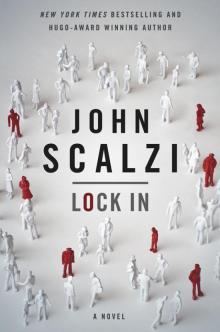 Lock In
Lock In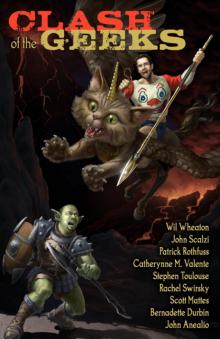 Clash of the Geeks
Clash of the Geeks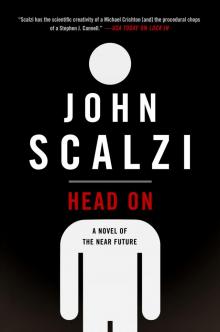 Head On
Head On The Dog King
The Dog King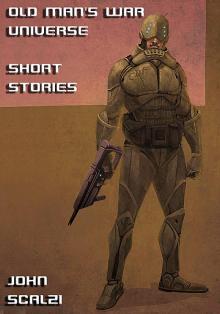 Old Man's War Universe: Short Stories
Old Man's War Universe: Short Stories The End of All Things
The End of All Things Tales From the Clarke
Tales From the Clarke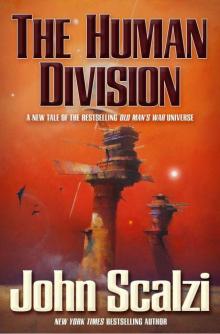 The Human Division
The Human Division The Android's Dream
The Android's Dream An Election
An Election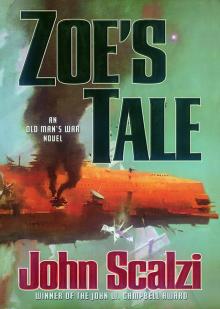 Zoe's Tale
Zoe's Tale Agent to the Stars
Agent to the Stars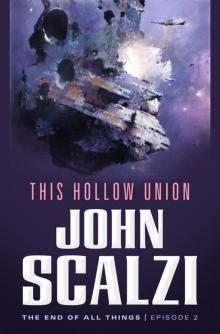 This Hollow Union
This Hollow Union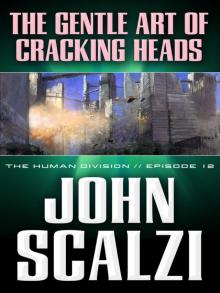 The Gentle Art of Cracking Heads
The Gentle Art of Cracking Heads Old Man's War
Old Man's War The Tale of the Wicked
The Tale of the Wicked Your Hate Mail Will Be Graded: A Decade of Whatever, 1998-2008
Your Hate Mail Will Be Graded: A Decade of Whatever, 1998-2008 Judge Sn Goes Golfing
Judge Sn Goes Golfing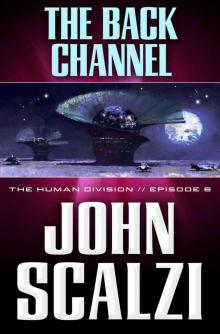 The Back Channel
The Back Channel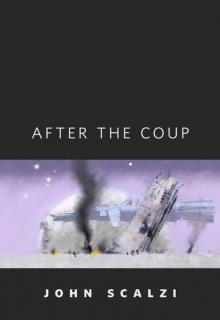 The Human Division 0.5 - After the Coup
The Human Division 0.5 - After the Coup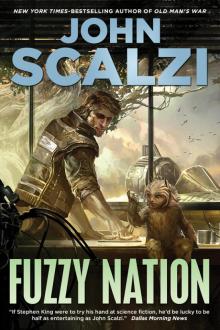 Fuzzy Nation
Fuzzy Nation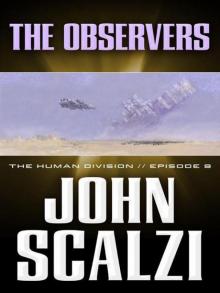 The Observers
The Observers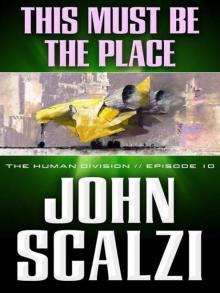 This Must Be the Place
This Must Be the Place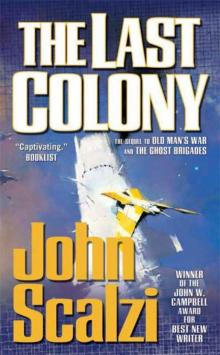 The Last Colony
The Last Colony Unlocked: An Oral History of Haden's Syndrome
Unlocked: An Oral History of Haden's Syndrome A Voice in the Wilderness
A Voice in the Wilderness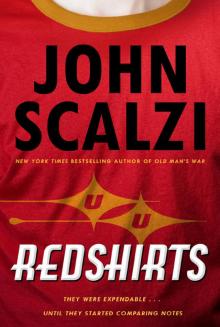 Redshirts
Redshirts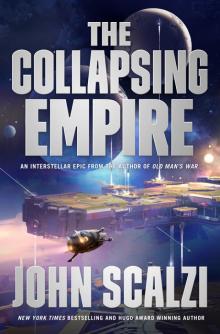 The Collapsing Empire
The Collapsing Empire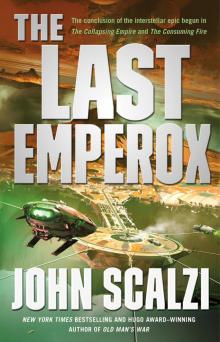 The Last Emperox
The Last Emperox The God Engines
The God Engines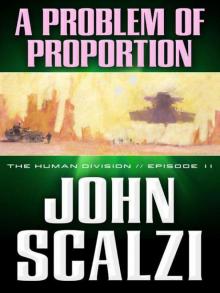 A Problem of Proportion
A Problem of Proportion THAT WAS THE MILLENIUM THAT WAS
THAT WAS THE MILLENIUM THAT WAS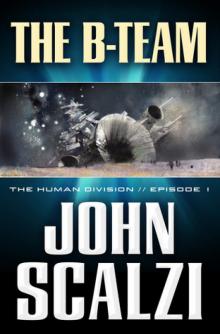 The B-Team
The B-Team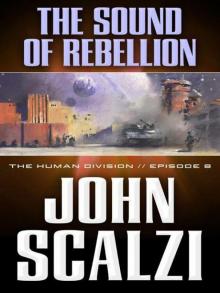 The Sound of Rebellion
The Sound of Rebellion The President's Brain Is Missing
The President's Brain Is Missing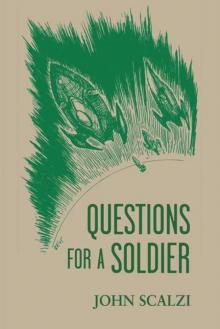 Questions for a Soldier
Questions for a Soldier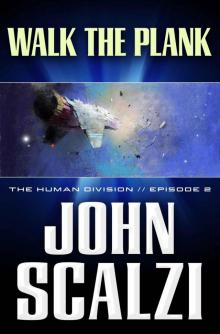 Walk the Plank
Walk the Plank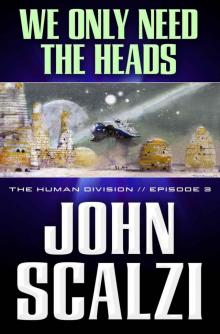 We Only Need the Heads
We Only Need the Heads How I Proposed to My Wife: An Alien Sex Story
How I Proposed to My Wife: An Alien Sex Story Earth Below, Sky Above
Earth Below, Sky Above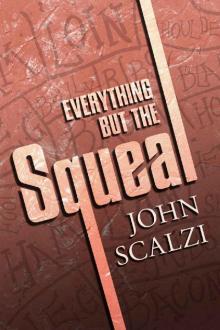 Everything but the Squeal
Everything but the Squeal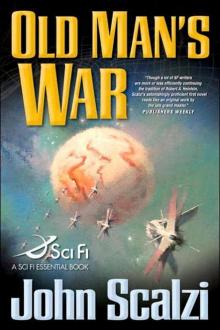 Old Man’s War
Old Man’s War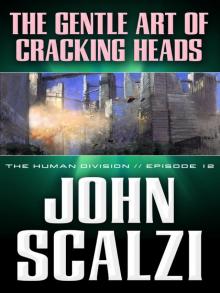 The Human Division #12: The Gentle Art of Cracking Heads
The Human Division #12: The Gentle Art of Cracking Heads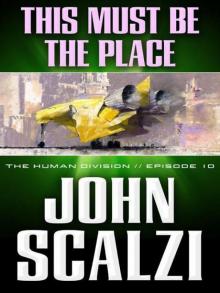 This Must Be the Place thd-10
This Must Be the Place thd-10 A Voice in the Wilderness thd-4
A Voice in the Wilderness thd-4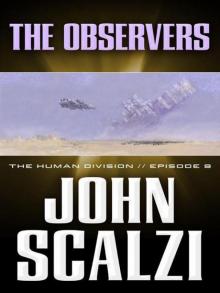 The Observers thd-9
The Observers thd-9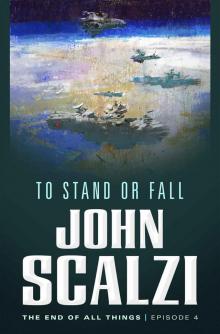 The End of All Things: The Fourth Instalment
The End of All Things: The Fourth Instalment Earth Below, Sky Above thd-13
Earth Below, Sky Above thd-13 Zoe`s Tale вбиос-4
Zoe`s Tale вбиос-4 After the Coup
After the Coup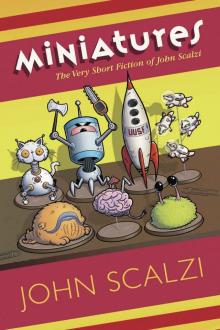 Miniatures: The Very Short Fiction of John Scalzi
Miniatures: The Very Short Fiction of John Scalzi The Last Colony вбиос-3
The Last Colony вбиос-3 Tales From the Clarke thd-5
Tales From the Clarke thd-5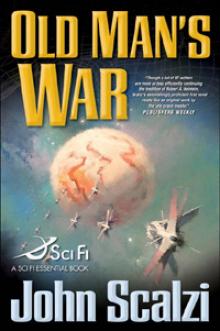 Old Man's War omw-1
Old Man's War omw-1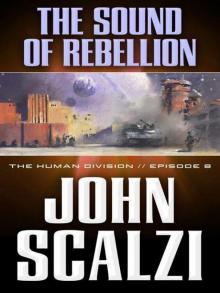 The Human Division #8: The Sound of Rebellion
The Human Division #8: The Sound of Rebellion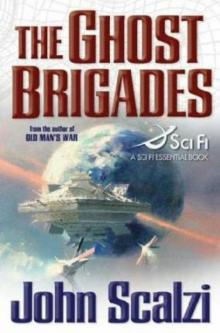 The Ghost Brigades omw-2
The Ghost Brigades omw-2 The Sagan Diary (old man's war)
The Sagan Diary (old man's war)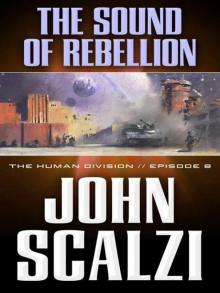 The Sound of Rebellion thd-8
The Sound of Rebellion thd-8 The Human Division 13 - Earth Below, Sky Above
The Human Division 13 - Earth Below, Sky Above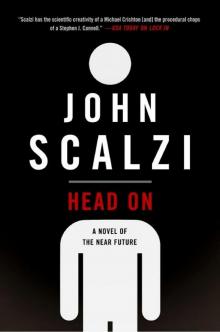 Head On_A Novel of the Near Future
Head On_A Novel of the Near Future The End of All Things: The First Instalment
The End of All Things: The First Instalment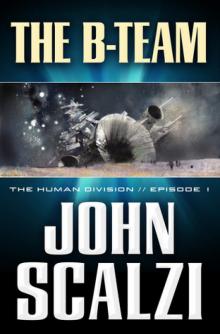 The B-Team thd-1
The B-Team thd-1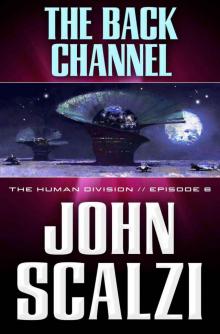 The Back Channel thd-6
The Back Channel thd-6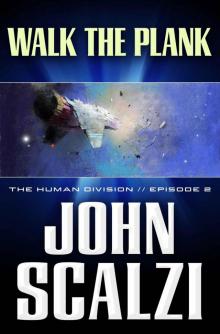 Walk the Plank thd-2
Walk the Plank thd-2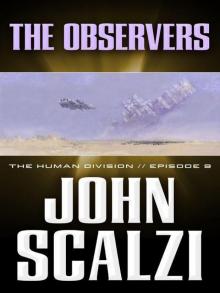 The Human Division #9: The Observers
The Human Division #9: The Observers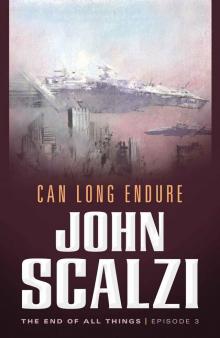 The End of All Things: The Third Instalment
The End of All Things: The Third Instalment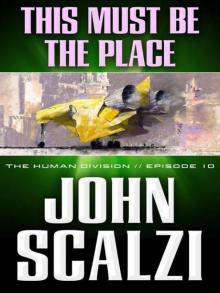 The Human Division #10: This Must Be the Place
The Human Division #10: This Must Be the Place The End of All Things #2: This Hollow Union
The End of All Things #2: This Hollow Union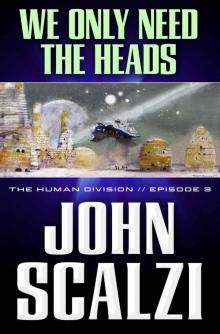 We Only Need the Heads thd-3
We Only Need the Heads thd-3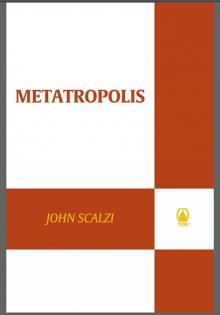 Metatropolis
Metatropolis The Dog King thd-7
The Dog King thd-7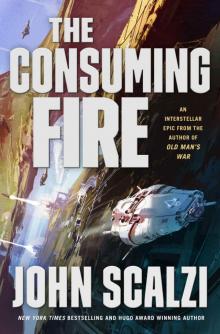 The Consuming Fire (The Interdependency)
The Consuming Fire (The Interdependency)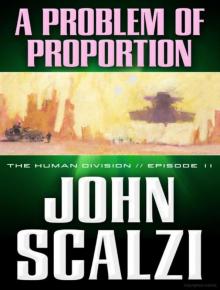 The Human Division #11: A Problem of Proportion
The Human Division #11: A Problem of Proportion